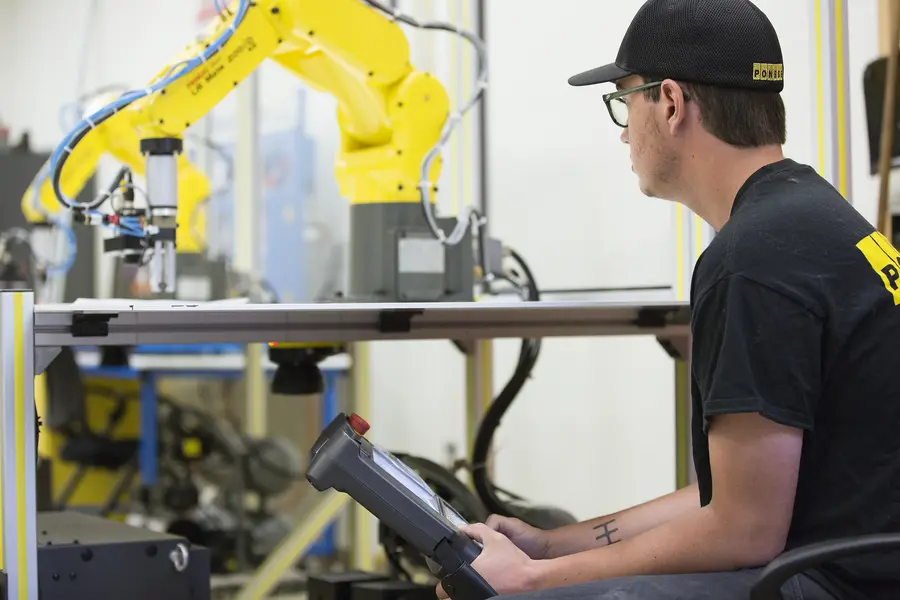Industrial Electronics Technician
Industrial electronics technicians work closely with engineers and electromechanical technicians to perform basic installation, maintenance, and repair activities for industrial electronic and mechanical equipment. This technical diploma will teach students industrial safety practices to include lockout/tag out, isolate faults, test fuses, wire motors, understand, and apply electrical principles to solve failures in the field. Students integrate these concepts with hydraulic, pneumatic, and mechanical systems. An introduction of programmable logic controllers help students develop entry-level skills in manufacturing.
Program Outline
| Course # | Course Title | Credits |
|---|---|---|
| 1010311500 | MS Word BeginningDescriptionThis course will cover creating a flyer, research paper, and business letter using Microsoft Word. |
1.00 |
| 1010312600 | MS Excel BeginningDescriptionThis course will cover creating a worksheet and chart; application of formulas, functions, and formatting; and working with large worksheets, charting, and what-if analysis using Microsoft Excel. |
1.00 |
| 1044910000 | Industrial Safety FundamentalsDescriptionIntroduces general safety for a manufacturing environment while raising the awareness of the worker to the hazards around them, and how to best protect themselves while working safely. Students will earn an OSHA 30 card and confined space certificate upon completion. |
2.00 |
| 1046211500 | Basic Electrical CircuitsDescriptionStudents will learn how to measure voltage, current and resistance in an electrical circuit. |
1.00 |
| 1046211700 | Inductance and CapacitanceDescriptionStudents will learn how to define and calculate incuctance and capacitance in an electrical circuit. |
1.00 |
| 1046211900 | Analyze TransformersDescriptionStudents will learn how to size a transformer and how to identify the step up and step down transformers. |
1.00 |
| 1062010200 | Hydraulic and Pneumatic OperationDescriptionStudents will learn basic hydraulic and pneumatic fundamentals with associated symbology. |
1.00 |
| 1062010600 | Ladder Logic Elements and Control LogicDescriptionStudents will learn the basics of sequencing and devices used in hydraulics and pneumatics machines. |
1.00 |
| 1062010900 | Analyze Directional Control ValvesDescriptionStudents will utilize the DCV's to control sequencing , timing and pressure control in hydraulic and pneumatic systems. |
1.00 |
| 1062011200 | PLC Fundamentals and Basic InstructionsDescriptionStudent will learn the components of the plc and beginning level programming. |
1.00 |
| 1080119500 | Written CommunicationDescriptionDevelops writing skills which include prewriting, drafting, revising, and editing. A variety of writing assignments is designed to help the learner analyze audience and purpose, research and organize ideas, and format and design documents based on subject matter and content. Also develops critical reading and thinking skills through the analysis of a variety of written documents. |
3.00 |
| Course # | Course Title | Credits |
|---|---|---|
| 1046212100 | Mechanical Drive SystemsDescriptionStudents will learn how to install a drive and properly align a shoaft. |
1.00 |
| 1046212400 | Belt and Chain DrivesDescriptionStudents will learn how to properly install and adjust drive components. |
1.00 |
| 1062011600 | Analyze the Use of OscilloscopesDescriptionStudents will learn the use of the oscillope to test electronic circuits beginning with common power supply systems. |
1.00 |
| 1062011800 | Analyze Sensing Devices and Op AmpsDescriptionStudents will learn the operation and troubleshooting of inductive, capacitive, optical and hall effect sensors. |
1.00 |
| 1062012000 | Analyze SSRs and Switching CircuitsDescriptionStudents will learn about and troubleshoot solid state relays and switching circuits commonly used. |
1.00 |
| 1062012300 | Three Phase Electric Motor ControlDescriptionStudents will learn about safety, 3 phase power transformation and manual control of three phase motor control systems. |
1.00 |
| 1062012500 | Investigate Troubleshooting MethodsDescriptionStudents will learn about the types and methods of troubleshooting for 3 phase motor control systems. |
1.00 |
| 1062012700 | Troubleshooting Common Motor CircuitsDescriptionStudents will examine the function and troubleshooting of reversing, automatic and timer controlled industrial motor control systems. |
1.00 |
| 1062012900 | PLC Timers Counters and Program ControlsDescriptionStudents will learn the operation and the use of timer, counter, MCR and first scan program instructions |
1.00 |
| 1062013300 | PLC Sequencing and Data Function BlocksDescriptionStudents will learn the operation of event sequencing, addition, subtraction, multiplication and division function blocks. |
1.00 |
| 1080413400 | Mathematical ReasoningDescriptionAn activity based approach is used to explore numerical relationships, graphs, proportional relationships, algebraic reasoning, and problem solving using linear, exponential and other mathematical models. Students will develop conceptual and procedural tools that support the use of key mathematical concepts in a variety of contexts. This course is not designed for Science, Technology, Engineering, or Math (STEM) students and/or others who require calculus. Prerequisite: 7785478000 Principles of College Math (C or better) or Accuplacer Algebra score >=35 or UW Math Placement Basic Math Skills score >=250 or ACT Mathematics score >=18 or Tailwind Math College Math Fund score >=16. |
3.00 |
| 1080919900 | Psychology of Human RelationsDescriptionFocuses on improving personal and job-related relationships through understanding and applying sound psychological principles. Topics include self-concept, motivation, emotions, stress management, conflict resolution, and human relation processes. |
3.00 |
At A Glance
How You'll Learn
On Campus
Online Classes
Multiple Start Dates
Flexible Pace
Spring 2025 Start Dates
January 13 - 16-Week Spring Term Start
March 10 - Additional 8-Week Term Start for Select Courses
Summer 2025 Start Date
May 19 - 12-Week Summer Term Start
Fall 2025 Start Dates
August 25 - 16-Week Fall Term Start
October 20 - Additional 8-Week Term Start for Select Courses
Program Tuition*
$6,610
Books & Supplies*
$525
*Total cost for degree completion is estimated by current course requirements, books, and supplies. Tuition and fees are set by the Wisconsin Technical College System and subject to change.
Financial Aid Eligible
Potential Indirect Costs
You may experience these additional costs, not charged by Nicolet, estimated based on length of program.
What You'll Learn
- Perform work safely
- Troubleshoot basic electrical and mechanical systems
- Repair basic electrical and mechanical systems
- Communicate technical information
- Integrate basic electrical and mechanical systems
Your Potential Careers
- Electrical or Electronic Maint
- Field Service Technician
Median Annual Salary
| $47,064 | $46,110 | $48,445 |
| Local | State | National |
|---|
EMSI 2022.1
Get Started
Your application can be submitted online, it takes just a few minutes to complete.

Related Programs

Become a Student

Earn a Bachelor's Degree

Prepare for College

Looking for Classes?
Gainful Employment Disclosure
This program is designed to be completed in 1 year.
This program will cost $4,539.00 if completed within normal time. There may be additional costs for living expenses. These costs were accurate at the time of posting, but may have changed.
Of the students who completed this program within normal time, the typical graduate leaves with $7,086.50 of debt.
The following States do not have licensure requirements for this profession: Wisconsin
For more information about graduation rates, loan repayment rates, and post-enrollment earnings about this institution and other postsecondary institutions please click here: https://collegescorecard.ed.gov/search/?name=Nicolet%20Area%20Technical%20College&sort=salary:desc

